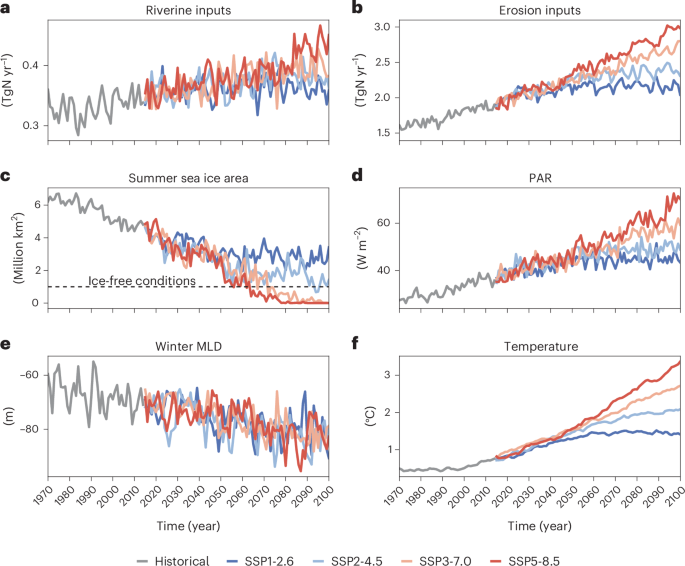Climate change and terrigenous inputs decrease the efficiency of the future Arctic Ocean’s biological carbon pump
IF 29.6
1区 地球科学
Q1 ENVIRONMENTAL SCIENCES
引用次数: 0
Abstract
The Arctic experiences climate changes that are among the fastest in the world and affect all Earth system components. Despite expected increase in terrigenous inputs to the Arctic Ocean, their impacts on biogeochemical cycles are currently largely neglected in IPCC-like models. Here we used a state-of-the-art high-resolution ocean biogeochemistry model that includes carbon and nutrient inputs from rivers and coastal erosion to produce twenty-first-century pan-Arctic projections. Surprisingly, even with an anticipated rise in primary production across a wide range of emission scenarios, our findings indicate that climate change will lead to a counterintuitive 40% reduction in the efficiency of the Arctic’s biological carbon pump by 2100, to which terrigenous inputs contribute 10%. Terrigenous inputs will also drive intense coastal CO2 outgassing, reducing the Arctic Ocean’s carbon sink by at least 10% (33 TgC yr−1). These unexpected reinforced feedback, mostly due to accelerated remineralization rates, lower the Arctic Ocean’s capacity for sequestering carbon. Changes in the Arctic could impact the oceanic carbon sequestration of the region. Here the authors consider regional biogeochemistry, including coastal erosion and river inputs, to show a 40% reduction in the biological carbon pump to 2100 under climate change.


气候变化和陆源输入降低了未来北冰洋生物碳泵的效率
北极经历的气候变化是世界上最快的,影响着地球系统的所有组成部分。尽管预计北冰洋的陆源输入会增加,但它们对生物地球化学循环的影响目前在类似ipcc的模式中基本上被忽略了。在这里,我们使用了最先进的高分辨率海洋生物地球化学模型,其中包括来自河流和海岸侵蚀的碳和养分输入,以产生21世纪的泛北极预测。令人惊讶的是,即使在各种排放情景下初级生产预计会增加,我们的研究结果表明,到2100年,气候变化将导致北极生物碳泵效率下降40%,这与直觉相反,其中陆源输入贡献了10%。陆源输入也将推动沿海地区的二氧化碳排放,使北冰洋的碳汇减少至少10%(33亿吨碳当量/年)。这些意想不到的强化反馈,主要是由于再矿化速度加快,降低了北冰洋固碳的能力。
本文章由计算机程序翻译,如有差异,请以英文原文为准。
求助全文
约1分钟内获得全文
求助全文
来源期刊

Nature Climate Change
ENVIRONMENTAL SCIENCES-METEOROLOGY & ATMOSPHERIC SCIENCES
CiteScore
40.30
自引率
1.60%
发文量
267
审稿时长
4-8 weeks
期刊介绍:
Nature Climate Change is dedicated to addressing the scientific challenge of understanding Earth's changing climate and its societal implications. As a monthly journal, it publishes significant and cutting-edge research on the nature, causes, and impacts of global climate change, as well as its implications for the economy, policy, and the world at large.
The journal publishes original research spanning the natural and social sciences, synthesizing interdisciplinary research to provide a comprehensive understanding of climate change. It upholds the high standards set by all Nature-branded journals, ensuring top-tier original research through a fair and rigorous review process, broad readership access, high standards of copy editing and production, rapid publication, and independence from academic societies and other vested interests.
Nature Climate Change serves as a platform for discussion among experts, publishing opinion, analysis, and review articles. It also features Research Highlights to highlight important developments in the field and original reporting from renowned science journalists in the form of feature articles.
Topics covered in the journal include adaptation, atmospheric science, ecology, economics, energy, impacts and vulnerability, mitigation, oceanography, policy, sociology, and sustainability, among others.
 求助内容:
求助内容: 应助结果提醒方式:
应助结果提醒方式:


